Join getAbstract to access the summary!

Join getAbstract to access the summary!
Daniel Oberhaus
The World Is Still Producing More Oil Than It Needs. Why?
Today, petroleum producers around the world will start shutting down wells after the Covid-19 pandemic caused demand to plummet. What took them so long?
Wired, 2020
What's inside?
This is what happens when an unprecedented drop in demand ripples through the oil industry.
Recommendation
You likely saw the reports about how COVID-19 is affecting the environment: pollution dropping up to 30% in big cities in China and the United States, swans and fish swimming in the suddenly clear waterways of Venice, coyotes frolicking on the normally bustling beaches and streets of San Francisco. Reduced human movement means nature can take back her own. But reduced human movement also means reduced demand for fuel. Daniel Oberhaus from WIRED offers readers a crash course in how the oil industry is handling the unprecedented drop in demand sparked by the global pandemic.
Summary
About the Author
Daniel Oberhaus covers energy and space exploration for WIRED. His book, Extraterrestrial Languages was published in 2019.
















Comment on this summary